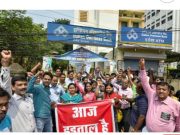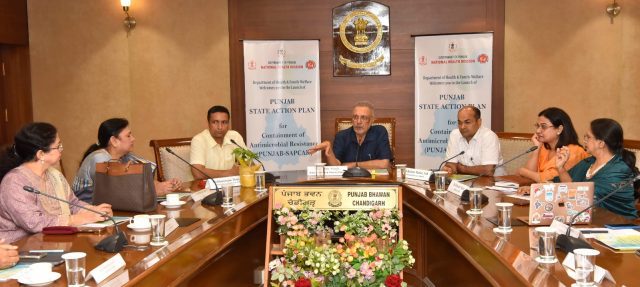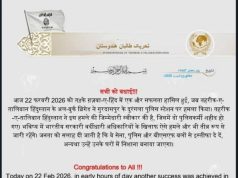’ONE HEALTH APPROACH’: TO CURB INDISCRIMINATE USE OF ANTIBIOTICS, ACTION PLAN ON ANTIMICROBIAL RESISTANCE LAUNCHED IN PUNJAB
— HEALTH MINISTER DR BALBIR SINGH UNVEILS COMPREHENSIVE PLAN TO COMBAT THE GLOBAL THREAT OF DRUG RESISTANCE
— PUNJAB BECOMES SEVENTH STATE TO LAUNCH STATE ACTION PLAN ON ANTIMICROBIAL RESISTANCE
— ACTION PLAN FOCUSES ON SURVEILLANCE, HYGIENE, INTER-SECTORAL COORDINATION, AND RATIONAL USE OF ANTIBIOTICS
CHANDIGARH, September 15:
In a significant move to counter the growing threat of Antimicrobial Resistance (AMR), Punjab Health and Family Welfare Minister Dr Balbir Singh on Monday launched the dedicated Punjab State Action Plan for the containment of Antimicrobial Resistance (PUNJAB-SAPCAR). With this, Punjab has become the seventh state in India and a leading state in the region to adopt a dedicated policy aimed at curbing the indiscriminate use of antibiotics, a critical global health challenge.
The comprehensive plan is anchored in the ‘One Health’ approach, which unites efforts across human health, animal health, agriculture, and environmental sectors to holistically respond to the AMR challenge, aligning the state with national and global health priorities.
The key features of Punjab’s AMR Action Plan include strengthened surveillance through monitoring and testing of samples from government health facilities via laboratory networks to track resistance patterns. It mandates high standards of cleanliness and hygiene in hospitals, clinics, and among food vendors to reduce public infection risks. A core component is robust interdepartmental coordination between health, veterinary, agriculture, and food safety departments for integrated action.
The plan strongly advocates for the rational use of antibiotics by promoting strict, prescription-based use in compliance with clinical guidelines to prevent misuse. It also focuses on expanding grassroots awareness drives at other government health facilities including District Hospitals, Sub-Divisional Hospitals, Primary Health Care centres including Aam Aadmi Clinis, in order to educate citizens on the dangers of self-medication and the critical importance of completing full treatment courses.
Further, it aims to curtail non-therapeutic antibiotic use in livestock and agriculture while encouraging safe alternatives, and strengthens primary healthcare under Universal Health Coverage to ensure equitable access to diagnostics and treatment, thereby reducing unnecessary antibiotic use.
Speaking on the occasion, Health Minister Dr Balbir Singh said, “Punjab’s AMR Action Plan marks a decisive step in safeguarding the future of healthcare. By adopting a One Health approach and aligning with global priorities, we are determined to preserve the effectiveness of life-saving treatments for generations to come.” He further emphasised, “Grassroots awareness is essential. At Government Health Facilities, we will intensify efforts to sensitise people discouraging them for self-medication and incomplete treatment courses, as both fuel antibiotic resistance.”
Principal Secretary Health Kumar Rahul stated that monitoring and surveillance from Aam Aadmi Clinics to laboratories, combined with strict hygiene and standard treatment protocols, will be central to the state’s efforts. He highlighted that cleanliness in hospitals and among food vendors is key to reducing infection risk in communities.
Mission Director National Health Mission (NHM) Ghanshyam Thori emphasised that the Action Plan hinges on interdepartmental coordination, requiring health, veterinary, agriculture, and food safety departments to function in lockstep. He affirmed that rational prescribing of antibiotics, in accord with clinical guidelines, will be crucial to preventing misuse.
The event was attended by experts and officials from leading institutions, including Dr. Jasbir Singh Bedi – Professor & Director, Centre for One Health, GADVASU; Dr. Anita Sharma – Director, Lab Medicine, Fortis Hospital, Mohali; Dr. Varsha Gupta – Professor & Head, Dept. of Microbiology, GMCH 32, Chandigarh; Dr. Loveena Oberoi – Professor & Head, Microbiology, GMCH Amritsar; Dr. Nusrat Shafiq – Professor, Pharmacology, PGIMER Chandigarh (Online); Dr. Parvinder Chawla – Senior Consultant, Internal Medicine, Fortis Mohali; Prof. Rupinder Bakshi – Professor and Head, Department of Microbiology, GMCH Patiala; Dr. Ritu Garg – Professor & Head, AIMS Mohali; and Dr. Amit Mandal – Fortis Hospital. Officials from Department of Health Services and NHM Punjab including Director Health Dr Hitinder Kaur, Dr Rohini Goyal, Dr Manju Bansal, Dr. Harpal Singh, Yugesh Kumar Rai, Srijita Chakrabarti and Dr. Neha Chaudhary were also present.
———–



















































